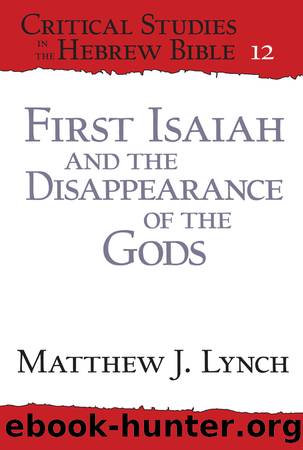First Isaiah and the Disappearance of the Gods by Matthew J. Lynch

Author:Matthew J. Lynch
Language: eng
Format: epub
Publisher: Penn State University Press
Chapter 3
Enemy Boasts and Prophetic Response in Isaiah 10
THE PREVIOUS CHAPTER EXAMINED THE important place that Isa 2:6â22 occupies within First Isaiah. I suggested that the passage foregrounds YHWHâs lofty exaltation and the fraudulent nature of so-called deities. This sets the stage for the assertion of YHWHâs exalted status throughout First Isaiah and beyond. When considered within the broader context of Isa 1â39, the fourfold use of ×××××× in Isa 2 suggests a deliberately derisive rhetorical strategy aimed at undermining trust in false gods in the face of YHWHâs uncompromising exaltation, which the book appears eager to underscore. This derisive rhetoric reappears on occasion throughout First Isaiah, though one can hardly call it pervasive. Instead, as suggested earlier, Isa 2:6â22 is an interpretive passage. It interprets Israelâs illicit political loyalties and rebellion through the lens of idolatry and then pits those loyalties against YHWHâs supremacy, thus emphasizing the importance of YHWHâs political supremacy. This will become especially important in Isa 10.
The twofold use of the term ×××××× suggests that Isa 10:10â11 belongs to the same thematic strand as Isa 2:6â22.1 Isaiah 10 thus forms a logical passage for exegetical analysis to test the thesis that First Isaiah exhibits a tendency to assert YHWHâs categorical supremacy and simultaneously strip the âgodsâ of their alleged divine status. As I hope to demonstrate, Isa 10 asserts YHWHâs supremacy vis-Ã -vis Assyrian power using the theme of idolatry, but with a new twist. In Isa 10, the boasting Assyrian king claims that he would do to Jerusalem and its ×××××× as he had done to Samaria and the nations (vv. 8â11). Assyria simultaneously asserts Yahwistic teaching and overreaches by assuming Jerusalemâs deity was one of the âimages.â YHWHâs quid-pro-quo response reduces Assyria to a (mere) club (v. 5) or ax (v. 15) in his hands, a thing made of wood. To that extent, Isaiah shows the ways that Assyria is a false object of ultimate trust.
This chapter proceeds along the following lines. First, I suggest that vv. 10â12 provide an interpretive key for vv. 5â19, which reframes Assyriaâs affront to YHWH in terms of blasphemy. Assyria equates YHWH with the non-deities of the nations. YHWH then turns the tables to suggest that Assyria is, like idols, an object of wood that its political superior wields. Second, I suggest that those same verses, in conjunction with vv. 8â9, reuse material from Isa 36â37 but intentionally remove references to the ×××××, thus highlighting Isaiahâs aversion to the word ×××××. Finally, I examine the continuation of the theme of YHWHâs political supremacy with an analysis of the unique divine name ××××× in Isa 10:16 and 33.
Download
This site does not store any files on its server. We only index and link to content provided by other sites. Please contact the content providers to delete copyright contents if any and email us, we'll remove relevant links or contents immediately.
| Exegesis & Hermeneutics | New Testament |
| Old Testament |
The Five People You Meet in Heaven by Mitch Albom(3561)
The Secret Power of Speaking God's Word by Joyce Meyer(3180)
Real Sex by Lauren F. Winner(3014)
Name Book, The: Over 10,000 Names--Their Meanings, Origins, and Spiritual Significance by Astoria Dorothy(2978)
The Holy Spirit by Billy Graham(2944)
0041152001443424520 .pdf by Unknown(2843)
How The Mind Works by Steven Pinker(2813)
ESV Study Bible by Crossway(2773)
Ancient Worlds by Michael Scott(2682)
Churchill by Paul Johnson(2578)
The Meaning of the Library by unknow(2565)
The ESV Study Bible by Crossway Bibles(2550)
The Gnostic Gospels by Pagels Elaine(2527)
MOSES THE EGYPTIAN by Jan Assmann(2411)
Jesus by Paul Johnson(2352)
City of Stairs by Robert Jackson Bennett(2347)
The Complete Dead Sea Scrolls in English (7th Edition) (Penguin Classics) by Geza Vermes(2277)
The Nativity by Geza Vermes(2226)
Ancient Near Eastern Thought and the Old Testament by John H. Walton(2223)
